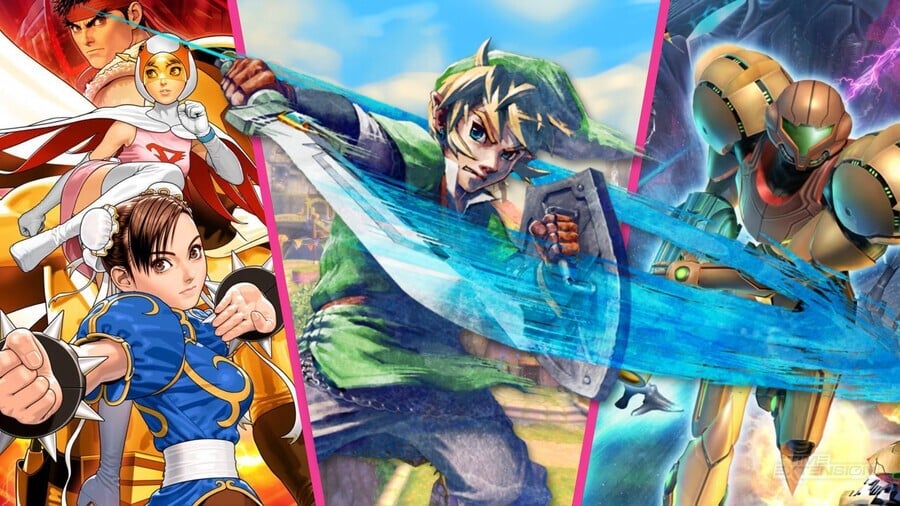Where Sunshine faltered, Super Mario Galaxy truly did shine. Taking Mario into space gave Nintendo the opportunity to play with gravity and give him a whole new (final) frontier of planetoid playgrounds to blast between, setting the stage for endlessly creative snippets of platforming perfection.
All that aside, there's also Rosalina and the Lumas' story to enjoy if you go looking for it; an affecting and underrated aspect of an utterly sublime game. It's available to play on Switch, and you really should — Super Mario Galaxy is an infectiously fun trip through the cosmos which begged the question: Where could the plumber possibly go next?
A sequel to Treasure's cult classic N64 rail shooter (which didn't make it to the West until it appeared on Wii's Virtual Console in 2007), this sequel improves on the experience and is arguably the better of the two games — yet another fantastic addition to a huge and impressively varied console library. We're thankful we didn't have to resort to importing this one back in the day.
You played it, your mum played it, your granddad played it; more to the point, you all enjoyed it. Drawing people in with a gimmick is relatively easy, but Wii Sports managed to genuinely entertain entire families and get them playing video games together for an extended period of time — perhaps for the first time ever.
This pack-in brought huge numbers of people together in silly Mii form and showcased the potential of motion controls to gamers from all generations. It's quite simply one of the most important video games ever made, and the most killer of apps.
Yes, Wii Sports Resort is arguably the better game, but this has more historical importance.
The first 2D entry to come to a home console since Super Mario World in the early '90s, 2009's New Super Mario Bros. Wii brought chaotic four-player local multiplayer to the series for the first time and gave old-school fans yearning for a side-on Mushroom Kingdom adventure something to chew on, with plenty of clever nods to the past. Anyone put off by the New series' 'wah's and cuteness missed out on a real platforming treat.
Ground-breaking as it was in the '90s, the 3D Zelda formula was starting to look a little tired by the mid-2000s, so while Twilight Princess is a very fine game, it certainly lacked the impact of its predecessors. The additional 'waggle' implemented in the Wii version didn't live up to the ideas of 1:1 swordplay we'd imagined, either. Did the entire world really need mirroring just to make Link right-handed?
Still, at the time, this was the only way to play the game in 16:9, and it made for a satisfyingly meaty launch title in North America. Not one for the purists, perhaps — you'll want to track down an expensive copy of the GameCube version for the left-handed, canonical geography of Hyrule (or just play Twilight Princess HD on Wii U).
Following the online exploits of Mario Kart DS, it was almost a given that Mario Kart Wii would follow suit and include the ability to play against the world — thankfully, despite the console's rather anaemic online capabilities, the experience was nothing short of stunning.
From the outside, the Wii entry might have sacrificed some of the kart racing series' personality, but the online multiplayer with support for up to twelve players, optional motion controls (who could forget that plastic wheel accessory?), and additional vehicles and characters helped make it one of the most accessible entries in the series. Successful, too. It sold a staggering 37.14 million copies.
A gorgeous, low-stress game that transports Kirby into a world of fabric and thread, Kirby's Epic Yarn was the first of Good-Feel's material-based platformers and is arguably still the best. We adore it, and anyone who says it's lacking in challenge is correct... but missing the point entirely. Kirby's Epic Yarn is one of the most joyous and creative games on Wii, or indeed any platform.
Showcasing the sort of swordplay we'd hoped Twilight Princess would contain, The Legend of Zelda: Skyward Sword was a beautiful entry in the series which dared to try some new ideas, something the franchise desperately needed at the time.
It arguably didn't get everything right — and we're still confused as to why Nintendo ditched the beautifully accurate IR pointer in favour of a gyro alternative which required constant re-centering (especially when everyone already had the IR sensor hooked up anyway!) — but we found the MotionPlus swordplay itself excellent.
As the very first game in the Zelda timeline, it's pretty much required reading for series fans, and while it has its naysayers, we look back on our time with Skyward Sword very fondly.
Collecting the original Prime trilogy in one handy package with new Wii controls, difficulty options, and other enhancements for the earlier GameCube entries (which received individual releases in Japan), Metroid Prime Trilogy is arguably one of the best compilation offerings in video games, ever. Purists may point to a handful of missing visual effects compared to the originals, but whichever way you look at it, this is a spectacular package — the best way to play these games, and a hardcore crown jewel on the most casual of consoles.

